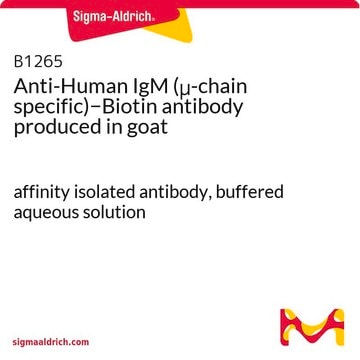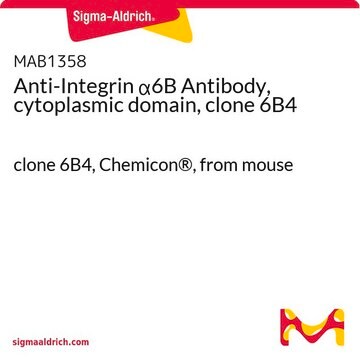B3523
Anti-Human IgG3−Biotin antibody, Mouse monoclonal
clone HP-6050, purified from hybridoma cell culture
Sinônimo(s):
Monoclonal Anti-Human IgG3
About This Item
Produtos recomendados
fonte biológica
mouse
conjugado
biotin conjugate
forma do anticorpo
purified from hybridoma cell culture
tipo de produto de anticorpo
secondary antibodies
clone
HP-6050, monoclonal
forma
buffered aqueous solution
reatividade de espécies
human
técnica(s)
direct ELISA: 1:40,000
Isotipo
IgG1
Condições de expedição
dry ice
temperatura de armazenamento
−20°C
modificação pós-traducional do alvo
unmodified
Procurando produtos similares? Visita Guia de comparação de produtos
Categorias relacionadas
Descrição geral
Especificidade
Imunogênio
Aplicação
Ações bioquímicas/fisiológicas
forma física
Armazenamento e estabilidade
Exoneração de responsabilidade
Not finding the right product?
Try our Ferramenta de seleção de produtos.
Código de classe de armazenamento
10 - Combustible liquids
Classe de risco de água (WGK)
nwg
Ponto de fulgor (°F)
Not applicable
Ponto de fulgor (°C)
Not applicable
Certificados de análise (COA)
Busque Certificados de análise (COA) digitando o Número do Lote do produto. Os números de lote e remessa podem ser encontrados no rótulo de um produto após a palavra “Lot” ou “Batch”.
Já possui este produto?
Encontre a documentação dos produtos que você adquiriu recentemente na biblioteca de documentos.
Os clientes também visualizaram
Nossa equipe de cientistas tem experiência em todas as áreas de pesquisa, incluindo Life Sciences, ciência de materiais, síntese química, cromatografia, química analítica e muitas outras.
Entre em contato com a assistência técnica




![N-(4-Bromophenyl)-3-[[(4-bromophenyl)amino]sulfonyl]benzamide ≥98% (HPLC), solid](/deepweb/assets/sigmaaldrich/product/structures/120/254/f9829d51-31a0-469a-ab52-5e2f49b48d81/640/f9829d51-31a0-469a-ab52-5e2f49b48d81.png)




